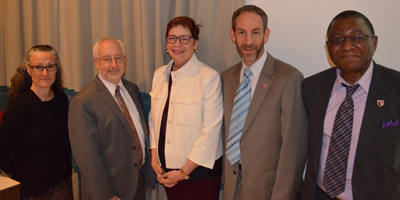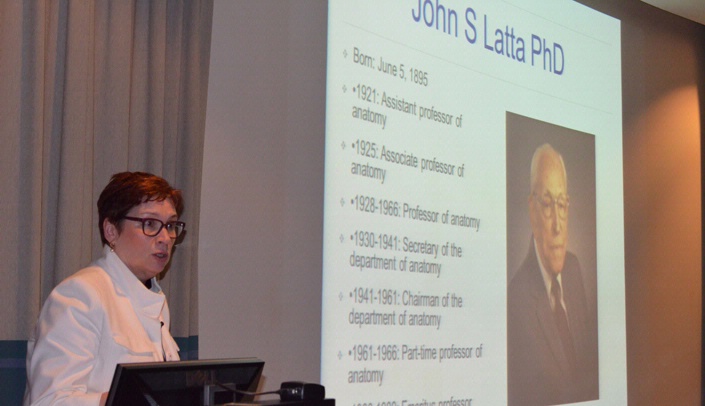Catherine Lucey, M.D., presented the 31st annual John S. Latta Lecture last week, speaking on “21st Century Faculty: New Skills, New Roles & New Responsibilities.”
 |
From left, Karen Gould, Ph.D., co-chair of the Latta Lecture Committee; Dean of the College of Medicine Brad Britigan, M.D.; Latta Lecture speaker Catherine Lucey, M.D.; Kelly Caverzagie, M.D., associate dean for educational strategy; and Vice Chancellor for Academic Affairs Dele Davies, M.D. |
Dr. Lucey, vice dean for education at the University of California, San Francisco School of Medicine, told her audience that medical educators find themselves at a crossroads, rethinking many aspects of medical and health professions education.
She spoke of four “enduring and emerging competencies” of the 21st century physician: direct patient care skills, biomedical and behavioral skills, systems improvement skills and implementation sciences.
Dr. Lucey also spoke to the “compelling need to rethink faculties’ approach to teaching basic science education,” adding that scientific principles and concepts are essential to addressing human health and disease.
“The medical problems we are facing today are complex and really, the type of science that we’re using to solve them are changing every day,” she said.
“Changing modes of clinical reasoning and care delivery means that we have to have physicians understand not just facts, but how those facts came into being and how to reason through problems.”
Dr. Lucey pointed out that medical professionals are continuously running up against new challenges: Zika, MERS, and SARS.
“The future learning work is going to require knowledge and problem solving in multiple domains of science, and we’ve identified six that we think are representative: traditional biomedical sciences, clinical translational science, social and behavioral, epidemiologic and data sciences, engineering and technology, and education.”
She spoke of continuously reinforcing the cycle of learning, thinking and reasoning — “Notice, memorizing is not here. Learning is change in long-term memory; memorization is change in short-term memory.”
She called the key challenge in medicine to “take information you learn in one context and apply it to another problem in the future, whether that’s a different patient, a different environment or even a different problem that has similar core themes. So that’s what we’re trying to make sure we embed in our learning environment.”
Basic science education has to keep coming back throughout the curriculum, she said.
“The essential science education must occur throughout the continuum of medical education,” she said. “We have to get away from this basic vs. clinical divide and understand that essential sciences are what we need to use daily so that we have the understanding and foundational knowledge we need to help our patients.”

Was the lecture recorded in any capacity? I would love to be able and sit down to listen to it.